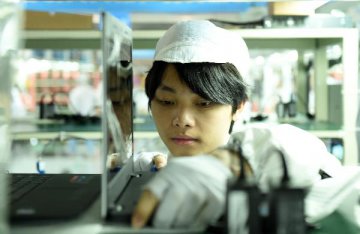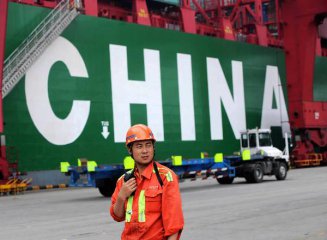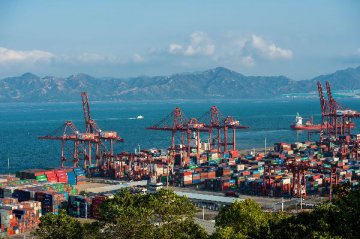
China's economy posted a 6.9-percent growth year on year in the third quarter of 2015, lower than 7 percent in the first half of the year, the National Bureau of Statistics (NBS) announced on Monday. In the first three quarters of the year, GDP hit 48.78 trillion yuan (7.68 trillion U.S. dollars), up 6.9 percent year on year. The service sector contributed more than half of GDP, according to the NBS.
SIX-YEAR LOW
This is the first time the quarterly growth rate has dropped under 7 percent since the second quarter of 2009. NBS spokesperson Sheng Laiyun said that global factors amid the world economic recovery had impacted on China.
"Expectation of a U.S. interest rate hike prompted volatility in commodity prices, stocks and foreign currency markets. Many countries devaluated their currencies, putting more pressure on Chinese exports, one of the three pillars of China's economic growth," said Sheng at a press conference.
China's exports growth dropped 7.9 percent year on year in the first three quarters to 17.87 trillion yuan, according to the NBS. During the first nine months, industrial output grew 6.2 percent year on year and fixed-asset investment climbed 10.3 percent.
Property investment grew 2.6 percent year on year, while retail sales of consumer goods rose 10.5 percent.
Year-on-year growth of China's value-added industrial output in the first three quarters stood at 6.2 percent, slightly down from 6.3 percent in the first eight months.
Fixed-asset investment growth was 0.6 percentage point slower than the expansion for the first eight months.
BRIGHT SPOTS
Despite disappointing growth in industrial output and fixed-asset investment, there have been positive signs in the slowed Chinese economy. Retail sales of consumer goods grew 10.9 percent year on year in September, slightly higher than 10.8 percent for August, NBS data showed on Monday.
The figure marked the highest rate of growth since the beginning of this year. HSBC analyst Qu Hongbin predicted that consumption will continue to grow stably and that "backed by consumption growth and home sales recovery, a modest economic rebound may be realized in the coming months."
"Both retail sales and property sales growth have been relatively strong," though the economy is "not yet out of the woods," being dragged by sluggish industrial production and fixed asset investment, said HSBC economist Julia Wang in a report mailed to Xinhua.
Services sector growth held up relatively well at the aggregate level, although the financial sector's contribution fell compared with the first half of 2015, according to the report.
"Overall, today's data point to some signs of stabilization in the Chinese economy," it said.
In the first three quarters, the value added of the service sector accounted for 51.4 percent of GDP, up 2.3 percentage points from the same period last year, said the NBS.
The HSBC forecast another 25bps policy rate cut and 150bps reserve ratio cut in the remainder of 2015, adding that more policy easing should help generate a modest growth pickup in the final quarter.
PROMISING PROSPECTS
"China's economic development is adjusting to the new normal and experiencing growing pains of shifting from old drivers of growth to new ones. Yet the fundamentals of a steadily growing economy have remained unchanged," said Chinese President Xi Jinping in a written interview with Reuters on Sunday in advance of his state visit to Britain.
"The new type of industrialization, IT application, urbanization and agricultural modernization that is in full swing has generated strong domestic demand and great potential for future growth. It has also made the economy more resilient and adaptable. All this, coupled with deepening structural reforms, means that China will have very promising economic prospects." Xi said.
China's restructuring efforts also made a dent in the Hurun Rich List in 2015 released on Thursday as more billionaires were made in emerging industries. This wealth bible showed that the Chinese mainland added 242 dollar billionaires in 2015, bringing its total to 596, which for the first time has outnumbered the 537 billionaires in the United States.
Technology was the fastest-growing source of wealth, with a 43-percent increase over 2014 although manufacturing and real estate remain the largest sources of billionaires. Almost all self-made rich men and women under 40 made their money in IT, according to Hurun, which found five such dollar billionaires.























Latest comments